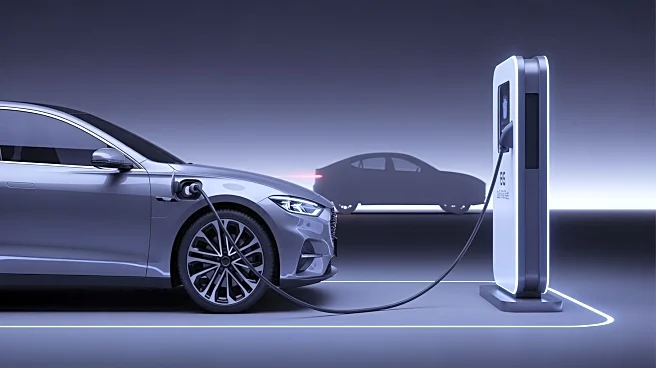What's Happening?
General Motors (GM) and Tesla are taking different approaches to the electric vehicle market, with GM planning to roll out a family of affordable electric cars following the revival of the Bolt, priced
under $30,000. GM President Mark Reuss emphasized the company's focus on internal R&D to compete with China's low-cost EVs, aiming to improve its Ultium platform and develop lithium manganese-rich batteries. Meanwhile, Tesla is focusing on the Cybercab, a vehicle optimized for full autonomy without a steering wheel, set to start production in Q2 next year. Tesla's strategy involves releasing trimmed-down versions of existing models to reduce costs.
Why It's Important?
The strategies of GM and Tesla highlight the evolving landscape of the electric vehicle market, with GM targeting affordability and Tesla focusing on autonomous technology. GM's approach could make electric vehicles more accessible to a broader audience, potentially increasing market share and driving industry growth. Tesla's focus on autonomy reflects its belief in the future of self-driving technology, which could revolutionize transportation. These developments are crucial for the U.S. automotive industry, influencing consumer choices, regulatory policies, and technological advancements.
What's Next?
GM's plans to release its first LMR-based EV model in 2028, developed with LG, could set new standards for battery technology and vehicle performance. Tesla's Cybercab production expansion may lead to increased interest in autonomous vehicles, prompting discussions on safety, regulations, and infrastructure. Both companies' strategies will likely impact market dynamics, with potential shifts in consumer preferences and competitive pressures on other automakers.
Beyond the Headlines
The competition between GM and Tesla could drive innovation in the electric vehicle sector, influencing global trends and encouraging other manufacturers to explore new technologies and business models. The focus on affordability and autonomy may lead to ethical and legal considerations, particularly regarding data privacy, safety standards, and the impact on employment in the automotive industry.









